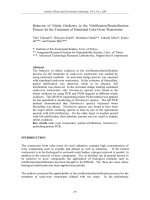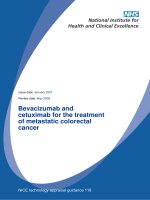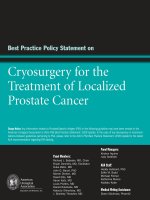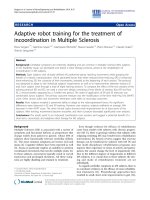Esomeprazole for the treatment of GERD in infants ages 1–11 months
Bạn đang xem bản rút gọn của tài liệu. Xem và tải ngay bản đầy đủ của tài liệu tại đây (646.84 KB, 16 trang )
Dr NGUYỄN THÚC BỘI NGỌC
DICH VU 2
Copyright 2012 by ESPGHAN and NASPGHAN.
European Society for Pediatric Gastroenterology,
Hepatology, and Nutrition and North American
Society for Pediatric Gastroenterology, Hepatology,
and Nutrition.
JPGN Volume 55, Number 1, July 2012.
BACKGROUND
Gastroesophageal reflux (GER) is defined as the
retrograde passage of gastric contents into the
esophagus or extraesophageal regions, which affects
approximately 50% of healthy infants ages 0 to 3
months.
In a study involving 948 healthy infants 13 months or
younger, 50% of those ages 0 to 3 months, 67% of those
ages 4 months, and 21% of those ages 6 to 7 months
regurgitated at least once daily
In most infants, regurgitation decreases in frequency or
resolves completely by 12 months of age.
Simple physiological reflux can lead to pathologic
gastroesophageal reflux disease (GERD) when reflux
produces adverse symptoms or characteristic histologic
and/or endoscopically visible changes (eg, esophageal
erosions).
Clinical symptoms of GERD in infants include recurrent
vomiting, poor weight gain, irritability, dysphagia,
discomfort, esophagitis and respiratory disorders.
One of the primary goals of acid suppressive therapy is to
relieve symptoms that may be associated with esophageal
inflammation and prevent other complications (eg,
esophageal strictures, respiratory involvement).
Esomeprazole is the only PPI approved by the US Food and
Drug Administration (FDA) for treating children 1 to 11
months old for erosive esophagitis caused by acidmediated GERD and is available in oral and intravenous
formulations.
Treatment of GERD in infants younger than 1 year has not
been studied as extensively as in older children or
adolescents, and the few clinical studies that have been
conducted yielded conflicting findings.
The objective of the present study is to evaluate the efficacy
and safety of esomeprazole in infants ages 1 to 11 months
with signs and symptoms of GERD.
METHODS
Study Design and Patients
This was a multicenter randomized, double-blind,
placebo-controlled, parallel-group, treatmentwithdrawal study conducted in 33 centers in the
United States, France, Germany, and Poland.
The study followed guidelines established by the FDA.
SELECT CRITERIA
Infants ages 1 to 11 months: They had a clinical diagnosis
of suspected GERD based on symptoms, endoscopically
proven GERD, laboratory test results, diagnostic tests.
Patients were required to have at least 1 of the symptoms
of GERD.
- Vomiting/regurgitation, irritability.
- Cough, wheezing and/or stridor, labored breathing,
- Respiratory symptoms triggered by feeding, feeding
difficulties (food refusal, choking, hiccups for >1
hour/day).
at least 2 times per week in a 4-week period.
During the 2-week open-label phase, all of the patients
received esomeprazole (Nexium) once daily orally
according to body weight.
After the open-label phase, infants were randomized 1:1 to
double-blind treatment with esomeprazole (at the openlabel dose) or placebo for up to 4 weeks.
The primary endpoint was time to discontinuation owing
to symptom worsening based on global assessments by
the parent/guardian and physician. Adverse events were
recorded.
RESULTS:
Of the 98 patients enrolled, 81 (82.7%) experienced
symptom improvement determined by physician
global assessment (PGA) during open-label
esomeprazole treatment.
During the double-blind phase, discontinuation
rates owing to symptom worsening were 48.8%
(20/41) for placebo-treated versus 38.5% (15/39) for
esomeprazole-treated patients (hazard ratio 0.69;
P=0.28).
The time to discontinuation was significantly longer with
esomeprazole than placebo (hazard ratio 0.24; P=0.01).
Numerical increase in the incidence of upper respiratory
infection in patients treated with esomeprazole (6/39
patients) compared with placebo (4/41 patients).
DISCUSSION
A majority (83%) of patients showed improvement in
GERD symptoms within 2 weeks of starting openlabel
esomeprazole therapy.
The downward trend in symptom severity was greatest in
the vomiting/regurgitation, crying >1 hour, and
irritability symptom categories. .
Esomeprazole was well tolerated.
These observations may indicate that infants with more
severe symptoms (eg, more severe vomiting and
irritability) are more likely to have GERD versus GER and
thus may be better candidates for acid suppression
treatment with PPI therapy.
In clinical studies of infants younger than 1 year, PPIs,
including esomeprazole, have not demonstrated a
statistical benefit in treating GER or GERD.
Possible explanations include the lack of an accurate
diagnostic test to distinguish acid-related disorders
from symptoms caused by allergy, motility problems.
CONCUSION
Esomeprazole was well tolerated and the oral suspension
formulation was effective for delivery in this population.
Infants with more severe vomiting and irritability may
benefit from and be more appropriate candidates for PPI
therapy.
The discontinuation rate owing to symptom worsening did
not differ significantly between infants receiving
esomeprazole versus those receiving placebo.
Improved diagnostic criteria in this age group are needed
to identify infants with GERD who may benefit from acid
suppression therapy.
THANKS FOR YOUR ATTENTION!









